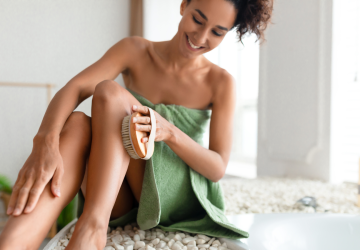Not All Vaginal Products Are Created Equal
Vaginal health. It’s an important part of your health, so you shouldn’t shy away from learning about products like vaginal moisturizers and lubricants (sometimes called personal moisturizers), especially given their numerous benefits. As with anything coming into contact with your body, you should take your time and get familiar with the labels of your intimate products. Knowing the ingredients can help you or a partner avoid any adverse or unexpected reactions.
Unfortunately, there is a pervasive amount of misinformation concerning over-the-counter sexual products. Let’s talk ingredients so you can stay informed and choose the right products for you.
Parabens
Parabens are common preservatives that are often added to cosmetics, including ones we use in intimate areas. Parabens are known to have antibacterial and antifungal properties. The Food and Drug Administration (FDA) says that they do not have information that shows parabens have an effect on human health.
The American Cancer Society agrees, saying that there are no clear health risks from parabens in food, drugs, cosmetics, and skincare products. Despite this, many myths concerning parabens still persist. They are not poisonous and in small quantities likely pose no significant health risk.
Glycerin
Glycerin is another common additive that may be considered a drying agent. Some women may feel that this additive may lead to yeast infections while others have no issue with this ingredient. There is not enough scientific evidence to link glycerin as a cause of yeast infections. For more information, read here.
Menthol
Menthol and synthetic derivatives of menthol, like niacin and peppermint oil, may be added to sexual arousal gels and can be irritating and drying to the vaginal lining. For some, it should be avoided since it can irritate and cause damage to the delicate mucus membrane. But many women without any specific underlying conditions, such as vaginal dryness, often enjoy these exciting stimulants and feel they heighten and intensify the orgasmic experience.
Polyethylene Glycol (PG or PEG-7)
PG can be found in a wide variety of products from cosmetics to cleansers. You may be surprised it’s used as a thickening agent in some vaginal products. It may affect the skin’s natural barrier and cause irritation or discomfort. Avoiding this ingredient is best.
Nonoxynol-9
Nonoxynol-9 is a detergent spermicide and is often found in condoms, lubricants, and some sex accessory cleaners. In some clinical studies, it was shown to potentially fight the HIV virus. However, this same ingredient could also cause damage that unfortunately may increase the chances of getting HIV or other sexually transmitted infections. So, negatives cancel out positives in this case. FYI potential damage connected to nonoxynol-9 includes micro lesions in the lining the vagina and/or damage of the protective rectal lining in the anus.
Added Fragrances or Colors
Some fragrances or colors can be nice in intimate products, but if you have sensitive skin, you may want to avoid them. Synthetically created smells are typically a mixture of phthalates and other chemicals. For some products, fragrances have been associated with irritation, redness, and other complaints. However, bodies vary so, if you don’t have sensitive skin, feel free to try products. For added measure, you can try a patch test by applying a small amount to part of your skin to test for any unwanted reactions before using the product.
You have many choices out there, and all with different combinations of ingredients! Now that you’re educated on common ingredients in vaginal health products, you can better decide what’s right for you.
Modern-Day Versions of “Our Bodies, Ourselves”
Sexual Wellness: Your Questions Answered
Michael Krychman
MDCMHis special interests include menopausal health, hormone therapy, sexual pain disorders, and loss of libido, chronic medical illness and medical devices and their impact on female sexual function. He is a well-known speaker who is featured locally, nationally and internationally. He has published many articles in peer-reviewed journals and has been featured in many scientific journals and lay magazines. Dr Krychman is an active reviewer for the Journal of Sexual Medicine. He was the Scientific Chairman for the 2010 International Society for the Study of Women’s Sexual Health annual educational meeting. He is an active member in good standing in North American Menopause (NAMS), International Society sexual Medicine (ISSM), European Society Sexual Medicine (ESSM), International Society Study of Women’s Sexual Health (ISSWSH), American Society of Sex Educators, Counselors and Therapists (AASECT) and American College of Obstetricians and Gynecologists (ACOG). He was a member of the Standard Committee for ISSM and has been a guest professor at the ESSM Sexual Medicine Summer School in Oxford, England. He was the creator of the recent WISH Initiative (Women’ Initiative on Sexual Health: www.yourvoiceyourwish.com) and the 2013 recipient of the WISH Outstanding Achievement award given by the ISSWSH. He is also on the professional advisory board for the Patty Brisben Foundation.
Dr. Krychman’s has published 7 books including his most recent one: The Sexual Spark, 20 Essential Exercises to Reignite the Passion, 100 Questions & Answers for Women Living with Cancer: A Practical Guide to Female Cancer Survivorship has been recently published, 100 Questions and Answers about Women’s Sexual Wellness and Vitality and Breast cancer Sexuality, Sensuality and Intimacy. He has been featured on the Today show and in the New York Times and US News and World Report World Report, The Wall Street Journal, New York Times, Health Magazine and many others. He was named one of Orange County Top Doctors for 2015 and 2016 in Menopause, Sexual Dysfunction and Vulvar Pain. In 2019 and again in 2020, he has been named an Orange County Physician of Excellence by Orange Coast Magazine in Survivorship, Sexual Medicine and Menopause.









